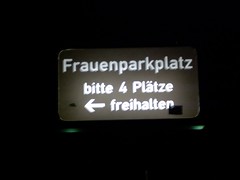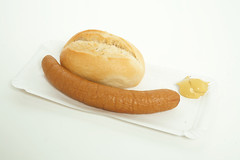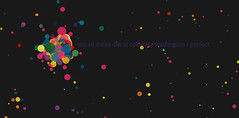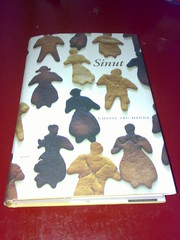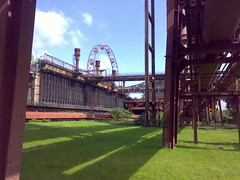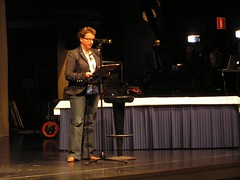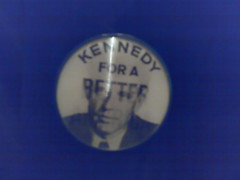Wednesday, December 26, 2007
Better and more equal dreams
1. Leea Klemola: Klemola is a Finnish actor and theatre director who has a reputation of a radical and angry young woman. She gave fantastic interview to IMAGE on theatre. She said that you can become a scary woman by only showing violence. ”It originates from the thinking that male creators make observations but things just blurt out from women. (...) I can’t stand educational theatre. In (Reko) Lundán’s plays I was irritated by the way he showed those small people, or politicians who grab those others. Not themselves. (...) Theatre is a place beyond morale and politics. The worst example of how theatre can be politically correct is the Enraged Roses Group. That thinking that when they are all women, it would turn everything they do into meaningful.”
2. Top Chef Final: In the American chef competition a woman called Tiffani lost to a guy mostly because she was perceived to be a difficult person although everyone found her menu more courageous. The winner cooked safe dishes and was a good lad. At the same time Gordon Ramsay makes millions by swearing when doing brilliant food. Women cannot win, can they?
3. Miehen työ: There is Finnish film beyond Kaurismäki. Aleksi Salmenperä’s Man’s Job is one of the best films I have seen showing how a man of the North deals with pride, loss and emotions. In the film a father gets fired from his job and when trying to cover the issue from his family but still provide the income, he ends up working as a male prostitute. Phenomenal acting and subtle humour. Highly recommended.
4. Anu Kantola: Kantola is a researcher in Media Studies and a columnist for the biggest Finnish political weekly Suomen Kuvalehti. She writes in issue 50/2007 about her observations on Finland seen from the inside and outside after reading all 1 600 stories on Finland from Financial Times. According the FT, Finland is doing superbly in education, national debt, innovations, music, cuisine, public expenditure etc. At the same time from the inside it seems that the country has a crisis in parenthood (Jokela shootings) as well as in health care (mass resignation of nurses) and people are leaving working life due to depression. ”Someone said that depression is a result of a situation where one’s external and internal realities don’t meet.(...) Even if I usually don’t like psychologisation, I started wondering whether this would work in the case of Finland. As if we had created a monster that acts out in an exemplary manner but which no one recognises as his or her own and whose ride no one likes. Changing realities could be started for instance from politics. Would it be in any way possible that sometimes in Finnish politics we could afford something? That instead of scaremongering we would create systems on the terms of people and not discipline and control? That instead of despair we would be bold and trusting?
As a result of Expedition Christmas, we could only say the following:
1. We need better and more inclusive dreams.
2. We still have issues regarding gender.
3. Finnish political and cultural discussion needs more contaminations from the outside.
Thursday, December 20, 2007
Stuffy
1. Culture: State Secretary writes a bizarre piece to the main newspaper - as a private person apparently - where he refers to the new dramatisation of Unknown Soldier (main Finnish book on Second World War) and builds a bizarre link between Kristian Smeds' direction and the rise of facism. State Secretary Volanen mentions the school shootings of Jokela but leaves the bridges between issues so vague that he can still walk away. Volanen has not seen the play.
2. Media: National broadcaster YLE launches a new channel directed to youth in Spring 2008 with a massive PR campaign. Last month they decided to close it down due to budget cuts. People who had been hired did not even get to start before they were fired.
3. Dreams: Main political weekly invites people to write letters to Finland on its 90th birthday. Subjects: alcoholism, importance of draft army, complaining about the role of artists, blurry stuff about economic dangers, ranting on and on how we have lost our relationship with nature and warning how this all could collapse any day. Happy Birthday.
4. Democracy: Prime Minister Matti Vanhanen is advising Ministers not to talk about undecided issues in public before the Cabinet has decided on them. This guarantees constructive decision-making apparently. At the same time the Ministry of Justice has founded a democracy unit. Well, at least they know where to start.
5. Advertising: Yesterday advertisement in the cinema before the film: promotion for a ring for supporting veterans, promotion by the lotteries on a campaign to help war invalids, advertisement on the dangers of drinking and driving, social awareness campaign on keeping a safe distance on the motorway and the lottery piece again.
With this little amount of light and these low temperatures one could use a bit of inspiration. One could use a few new ideas, some fun and true engagement. It feels amazing how people can seem so bloody unhappy with this prosperity. As there are no hopes for people to grasp on, especially in December it really seems like everything is going down the drain.
Friday, December 14, 2007
The Oprah Way
I am a big fan of her next to all those women. I mean Oprah should be running for president, not Barack Obama that she has now endorsed. Who cares about Obama anymore if you have a chance to see Oprah live? She is an amazing figure in the US - she is beyond criticism as one of the strongest symbols of the American Dream - coming from tough background, made her success with hard work and now giving back to the society.
The Oprah factor is a good reminder also of the way we are as people. We can be interested in serious and light subjects at the same time - we can be triggered by an intense discussion on tansgender identities or by a couple interview with Katie Holmes and Tom Cruise. Very few of us are either serious or shallow - we can be both. What I love in Oprah is that she manages to introduce difficult subjects into the living rooms through her media conglomerate. She is in not preaching to the converted, which is why she kicks ass.
My Oprah Day could consist of the two following things:
1. Finetuning a Christmas greeting for the staff from our team.
2. Having an article on youth culture published in Eurozine.
As I said, we can be both.
Wednesday, December 12, 2007
Saturday, December 08, 2007
Reasons to love Berlin
Now, on Saturday afternoon, I am extremely glad I did not cancel the trip. I feel like my batteries have been charged – even a KLM steward said as I boarded the plane:”Sir, you look very happy today.” On Thursday we had an inspiring session for the development of eurotopics.net and I really felt like I was able to help them in improving the product. I pushed forward some funding things and in the evening visited a cute small cultural event of our partner organisation Schlesische27 in Kreuzberg.
I just love Berlin. It is definitely up there with Istanbul on my list of fantastic cities,. Let me elaborate why:
1. Cool Germanica: It is very German with the Christmas markets and bratwursts but at the same time extremely trendy with it underground bars and designer shops.
2. Human scale: Starting from its incredible metro system and continuing to its coffee houses, Berlin is made for people and their interaction.
3. Affordable: Studio flat for 400 euros. Beer for one euro. Club entrance two euros. Lunch 5 euros.
4. Creative: I just met yesterday a Finnish friend of mine who had moved to Berlin 1,5 months ago to try and see how life here would work. As he put it:”I have savings for 6 months, then I really need to start seeing what I wish to do.” His story is not original in Berlin.
5. Scruffy: At a popular club the most important thing is not a trendy haircut or T-shirt. But that is also allowed. Punk still exists in Berlin.
6. Turkey: Some parts of Berlin are like you would be in a Turkish city. The vegetable salesmen shout in Turkish and you have this distinct smell where goat milk mixes with pickles and olives.
And ladies and gentlemen, there is hope: I saw yesterday an American film in Berlin WITHOUT dubbing.
There is one minus point: Tegel. Berlin’s airport is shameful for such a fun city. It is too small and so badly organised that you end up walking forever or standing in line for ages.
Thursday, December 06, 2007
From somewhere
Two days ago a Finnish friend of mine was visiting Amsterdam and we sat in a cafe with a group of friends when the discussion shifted to nations and nationalities. One of the people around the table described his feelings a fortnight ago when he received his Dutch nationality and passport. He said that he felt confused being rewarded something like that rather quickly and being surrounded by Turkish and Moroccan old ladies who had been in the Netherlands for 30 years and just now got their full rights. My friend described how tired the women look, nearly like they had already given up hope. Nationaly can be a mixed set of feelings.
I mentioned in that discussion that I nowadays introduce myself as being from Amsterdam. I would not say that I am from the Netherlands but from Amsterdam. At the same I do feel Finnish. One could easily go into the blah-blah on the death of nation states and state that passport is just a document. But at least for me giving up my Finnish passport for instance for a Dutch one would mean losing something that has always been there. The Finnish passport is a sign of my roots, it shows my soil.
Usually the Finnish independence day speeches stress the struggle the nation went through defending its independence 1939-1945 and the high price paid for it. I have this experience even in my immediate family - when Finland lost the Carelia region, my then 17-year-old grandmother was amongst the half a million people who needed a home when the border shifted West.
My Finnish identity has never been contested. I was given it and no one has tried to take it away from me. I have lived my whole life with a safety net provided by my family and my country. It has allowed my to jump because I have always known that there are mechanisms and people to catch me.
What does being Finnish then mean to me? It is not a flag, it is not a winned battle. I and I think most of my generation find it difficult to grasp these concepts that define the nations and the EU for the baby boomers. For me being Finnish means a sincerely loving family, it means being comfortable in nature, it means a language that allows one to invent words that others understand, it means being comfortable with nudity, it means appreciating the simple, it means taking care of the smallest and the weakest, it means being able to leave your bag on the chair when you go to the toilet in a cafe, it means school lunches, it means not cheating nor lying and it means giving space.
My Finnishness does not require living within its borders. The things listed above are not mentioned in my passport or in the constitution. That is why my sense of being Finnish does not contradict with being from Amsterdam.
Happy birthday, homies.
Saturday, December 01, 2007
I know
Today is World Aids Day. The Dutch Aids Foundation has been running a big campaign in the course of the last weeks with beautiful children looking into the camera in posters saying Stop Aids Now. I found the campaign highly moving and of great excellence – it states that AIDS is not only amongst the gay population and that it does not always show.
I watched just a while ago again the brilliant TV drama Angels in America which focuses on the 1980s in the US – the time when AIDS broke its way into the public sphere and caused fear and panic. We have come far from those times – the awareness of the AIDS situation in Africa is far higher and we as a society realise that AIDS is amongst us. This does not go without negative side effects. The fear and awareness caused for instance by Freddie Mercury’s death is gone and a lot of people act rather self-assured – not wanting to know.
I know. I did the test yesterday. Not out of any other reason but for the fact that every sensible person should get tested regularly. Those who have taken the test, know exactly how scary it is. Those who have not, let me give you a brief.
The clinic here in Amsterdam is quite busy. The test is for free and you hear the results in 30 minutes after the test. I started by waiting for my turn in the crowded hall. Some people come to the clinic with friends but most people are there alone. Joking is quite limited. I found myself looking at people and thinking:”Does he have it? Does he think I have it? Why is she here?”
After 50 minutes or so I was called into the informative session where they take your details and ask you some basic question. The woman yesterday was extremely nice and certainly quite used to nervous people. I found myself mumbling and making mistakes in my mobile phone number. She did not assure me that things will be fine – instead she asked:”What do you think the result will be”. After her interview I was sent back to the hall to wait for the test. It took ages before I was called. The woman was highly calm and kind – I took notice of the empathy in her eyes. She explained again what will be done. She started with rather frank questions about sexual behaviour, then took 3 samples of blood and asked me to get on the examination table. It is not too comfortable when you have different tools and sticks pushed into most holes in your body. I was gagging when she checked my throat with a sample stick. The other things you can imagine yourself.
After the test I was asked to give a urine sample and then wait for 30 minutes for the results of the HIV test. I tried to read a newspaper, but found myself walking back and forth to the coffee machine, going to the toilet, checking my mobile. The only thing occupying my mind was:”What if?”
After 30 minutes I was called into the room again. She told me that my results came through good and the result was negative. I started sweating out of relief. Funnily enough, I was not smiling too much. I must have thanked her four times when leaving the room. Never cycled that lightly to the centre.
Even if my test came through as I wished, AIDS is amongst us. It is not always a result of promiscuous behaviour. Some of us are born with it, some of us just have bad luck. Be safe. Happy World AIDS Day.
Thursday, November 29, 2007
Just the two of us
I must say it was a tremendously good experience. Both my boss and I had a very constructive tone and tried to both be honest and concentrate on solutions and recommendations. I feel both of us had a chance to say things directly and our assessment was quite a lot on the same lines. These weeks are quite horrible at work with all the end-of-the-year stuff so actually the appraisal turned out to be a moment to breathe.
I know a lot of people make fun of the annual evaluation talks with the forms and such but after today I am firmly supporting the obligatory nature of this procedure. It lets both the superior and the employee to get things off their chest and at least in my case it came exactly at the right time. I highly recommend it.
Sunday, November 25, 2007
Saturday, November 24, 2007
Business first
Lisbon is amazing. We spent five hours walking up and down the hills, photographing the bright houses and the street art and stopping for an espresso (0,60 euros) and cake (0,80 euros) in small cafes. Now it is time for some rest before heading out for dinner.
For yesterday’s flight I bought the Guardian which is always a highly pleasurable experience. One thing that I truly miss in the Netherlands is the routine of reading daily the paper. The best quote in yesterday’s edition was in an interview with Deborah Meaden, an investor taking part in BBC’s entrepeneurship programme Dragon’s Den. The idea of the programme is a simple one: 5 investors listen to pitches of starting entrepeneurs and then decide whether they will invest their own time and money into the proposal. The dragons (the investors) are harsh, smart to a scary extent and extremely success-driven multimillionaires. Meaden is the only woman amongst them. Meaden rocks:
Hannah Pool: Are you as mean in real life as you are on Dragon’s Den?
Deborah Meaden: Stand in front of me and ask me for a quarter of a million pounds when you can’t be bothered to tell me what your turnover numbers are and I am that person. People try to let me off the hook and say I’m much nicer in real life – but if somebody is asking me for my money, my job at that moment is to establish whether or not this is a good investment, not to win friends and influence people.
H.P.: It mush bother you when the reviewers describe you as charmless.
D.M.: (Laughs) Well, I hope I’m not. My friends don’t call me charmless, people who meet me don’t say I’m humourless. People can call me what they like – fat, ugly, sour – but tell me I’m not fair, tell me I’m not ethical, those are the things that bother me.
H.P.: You are much softer in real life.
D.M.: It’s a different environment. Nobody is like the person I am on TV, surely, only Cruella de Vil, or the wicked witch from Snow White. It’s me, but it’s me in that environment. I’ve got that job to do. It would be worse if I tried to be different, if I tried to be soft. I’m a business person first and I happen to be doing television.
I really admire her. This is true equality. Her attitude reminds me of Hillary Clinton’s comment after last week’s attacks towards her by all the other candidates. She said that people are not attacking her because she is a woman, they are attacking her because she is winning.
Tuesday, November 20, 2007
You have no new email
And it happened once last week. I was wondering why a friend had not answered a long email I sent. He usually answers quickly.
And it happened today. I finished a long email and pushed the 'Send' button. The programme said: 'the session has expired'. My two-page email and 30 minutes of work disappeared somewhere.
In the first case our company firewall had blocked all the messages as spam. Same happened in the second case. And in the last case the normally reliable programme failed me. All and all: email let me down.
A few years ago I read a fantastic essay from the American writer Jonathan Franzen on the impact of postal service in the way we trust things (essay published in the collection How To Be Alone). Franzen pointed out how blindly we trust that an important document finds its way to the recipient. Just think of it: how often do you make copies of something you ship? Franzen continued on elaborating how an unreliable postal system would deteriorate easily our entire trust on the system as a whole.
I come from a country where the system is designed based on those who do right and where people trust their civil servants. I admit being foolishly naïve and idealistic in many ways. Even with the excessive services that the Nordic states provide, the system - due to its trust-based form - actually remains quite cheap.
Until now I have trusted email blindly. I have felt confident that the messages go through and strangers are not reading them. Of course I have read articles about the dangers of sharing information or writing private matters through company email but they have not really had any influence on my actions. I hate the fact that I need to reposition myself in this respect.
Friday, November 16, 2007
And what are you trying to say?
The most powerful comparison in the document was the comparison between the old headquarters of the Helsinki telephone company HPY (now Elisa) and the headquarters of Nokia (new). When HPY’s headquarter was a big, slightly gothic granite monolith communicating ”we are here to stay”, Nokia’s glass complex communicates ”we are dynamic, open and transparent”. The irony of this all was that in the midst of its economic problems Elisa sold its headquarters to a new media company.
Why am I ranting about this? Because I am currently in Budapest – a mixture of romantic old sights and gigantic Tesco hypermarkets. At the same time Budapest is perfect for that getaway weekend of the good old times and for full-blown ”you can buy a washing machine at 3 a.m. if you want” capitalism.
Today I had a meeting at MTV, the Hungarian national television. The organisers of my previous meeting at British Council drew me a map. They said:”It is a massive building, you cannot miss it.”
Well, I could. The building in the picture is MTV headquarters. It is a colossal castle that in my mind looks more like a presidential palace or a parliament than a place where you make TV programmes. I was going around and around the square searching for a media house, passing the castle a few times. Finally asking a local helped. She looked me like I was retarded. I could see what she was thinking:”Are you stupid or what? It is the biggest building on this square right behind you.”
Diversity is not only a question of understanding, colourful hand dolls and living together. It is also realising that something natural to us can be perfectly alien to someone else.
Sunday, November 11, 2007
On Violence
I attended yesterday in Vienna a meeting for European online media initiatives such as Eurozine, OpenDemocracy, signandsight.com and Transitions Online. The discussion during the day was on what counts as a European issue. However, during the evening we found ourselves discussing once again in the national roles – as a German, as a Finn, as an Austrian, as a Swede.
Yesterday morning I had once again a realisation that I do live outside my own country. As I was brushing my teeth I had BBC World on which covered extensively the riots in Georgia. In the ticker running on the bottom of the screen I noticed one headline saying:”Teenager shoots seven others and a teacher in Finland”. I stopped brushing and just waited to see it again. ”But something like that cannot happen in Finland. I must have seen wrong”, was my immediate reaction. I texted a friend of mine and my sister and in a minute, my sister called me back.
My first reaction was anger. Why the hell things like this happen? How can someone at that age hate the world so much that he sees killing other people as a resolution? In the discussions during the day I got the full picture. I still could not get over the anger but it was coupled with immense sadness. This morning I checked the website of Helsingin Sanomat again. My anger grew when reading news about fansites for the killers. What the hell is wrong with the way we perceive humanity and violence? I could not help thinking about the speech Robert Kennedy gave over violence.
I am at the airport waiting for teenagers flying over from countries ranging from Turkmenistan to Denmark for the annual The One Minutes Festival. These are people of the same age as the perpetrator and the victims – filled with optimism and talent. What went wrong in Jokela?
When these school shootings have happened in the US, the reaction in the European media has often been that this could never happen in Europe. Europe still has a tendency for a rather arrogant way of defining its values and traditions with a cherry-picking method. Even taking into consideration the role of the European Union as a successful peace project, we are a violent continent. In that sense the tragic incident which happened in Jokela is a European experience which needs joint discussion on how we perceive violence and guns.
--
Addition on Sunday evening: do get a good picture of what the winning oneminutesjr videos were like, check these:
Joseph Fadel: Flow (Lebanon)
Palvan Geldinysh: Rakyp (Turkmenistan)
Jakunze Fiston: Je m’exprime (Burundi)
Sunday, November 04, 2007
It is art, not a reality show
I cannot call myself a regular opera attendant by any standards. This year I think I have seen three productions of which today's performance was the most moving. One could say that it is not a very challenging opera for the audience as it has a relatively simple plot, some famous arias and so forth. My friend educated me that Lucia di Lammermoor is used for testing sopranos as it goes really to the extremes in testing the whole scale. But it worked for me as it went right into your bones and your heart.
A lot of people dislike opera with the argument that it is so artificial. I think there is something twisted in that statement. I feel that maybe theatre is not always the best comparison for opera. It should be more seen as an interpretation of certain, quite universal emotions. In that sense maybe music or visual arts helps us forward. I mean it is not very helpful to judge Mark Rothko's art based on its accuracy. We should look more into the impact on the viewer, cleverness of the interpretation and the level of originality in the creation.
Saturday, November 03, 2007
Reflections from Prix Europa
Two weeks back I spent a week in Berlin seeing and judging the best of the best when it comes to European television. I wrote a piece for the website of the European Cultural Foundation on the subject.
Wednesday, October 31, 2007
"You wanna do something after work..."
After evenings like this I go back to the lyrics of my life mantra, Baz Luhrmann's song Everybody's Free (To Wear Sunscreen). I listen to it at least once a month and everything he says makes sense. I actually do strive to live my life the way he preaches. Tonight was the time for the following:
"Understand that friends come and go,but for the precious few you should hold on. Work hard to bridge the gaps in geography in lifestyle because the older you get, the more you need the people you knew when you were young."
Amsterdam would not be the same without a few key people here. After nearly three years we are starting to reach this level where you don't need to explain everything, the other person just knows. Every single time I go back to Finland I realise how special it is to have friends who you have experienced things with and who know you inside out. And it is such a warm feeling to realise that the same is evolving here. Tonight we did not do anything special - met for dinner, a few drinks and talked - but it was still absolutely beautiful.
For me places live and die with the people. When it comes to friends, I am bloody fortunate.
Friday, October 26, 2007
We are still here
A stunningly beautiful woman in a bright-coloured dress carrying a water canister on her head in the tormenting heat of a desert. A group of wide-eyed children with bloated stomachs staring straight into the camera with flies on their faces. A corpse of a black man pecked by vultures. Thousands and thousands of tents, thousands of people waiting in line for fresh water.
We’ve all seen these images over and over again. As time goes by, the killings of dozens and hundreds of people in Darfur or starvation in Ethiopia stop being breaking news and we turn for new catastrophes and new imagery. Dave Eggers’ latest novel What is the What (Hamish Hamilton 2006) follows the path of Valentino Achak Deng from the Sudanese village of Marial Bai to a suburb of Atlanta. The biography is a powerful slap on the Western face. We cannot dare to forget.
Eggers’ first novel, autobiography A Heartbreaking Work of A Staggering Genius was a bestseller worldwide. The tale of a young man in a somewhat late puberty bringing up his brother alone was praised for the extraordinary combination of wit and intimacy. The novelist’s involvement in supporting young writers through his publishing house McSweeney’s and founding of creative writing schools into American suburbs turned him quickly into a young star and a pet of the media. Although he has published a novel and short stories during the last years, What is the What is Eggers’ strongest and most passionate work since the autobiography. Valentino Achak Deng’s story is an extremely unsettling take on the human suffering behing the newsfeed. Through Valentino the common images of the conflict and famine suddenly get a human face.
Stylistically What is the What continues on the familiar path from Eggers’ previous novels. He has the patience for details whether when describing how Valentino buries his friend on the walk through the Sudanese desert or how it feels when burglars drop a phonebook right on your face. Eggers has told in the numerous interviews on the novel that he spent nearly two years with Valentino including a trip to Sudan. The intimate contact between the author and the protagonist grabs the reader firmly from the first page. Dave Eggers as a white New Yorker amazes with his skill to get skin-deep on how life is in a refugee camp or a Sudanese village. Eggers’ eye for absurdity and humour carries the book through the rough incidents for instance by describing the way the often naïve Western and Japanese aid workers are perceived by the refugees.
One cannot complete the novel without being moved and shaken. What is the What is a masterpiece in showing parallel the inequality of the American health care system and the hatred and complexity feeding the conflict in Sudan. Valentino Achak Deng’s life reminds the reader that refugees like him are not ignorant bystanders but people with dreams, anger, families and joys. During his life by now Deng has already gone through things no human being ought to experience. Teenager boys should not be seeing their friends losing the will to live or witnessing senseless killing. ”The unknown boys ran toward her”, he describes the violence feeding violence in Sudan. “Achor Achor stayed with me. When they were twenty feet from her, the woman turned, lifted a gun from the grass, and with her eyes full of white, she shot the taller boy through the heart. I could see the bullet leaving his back. His body kneeled and then fell on its side, his head landing before his shoulder.”
What is the What shows the ambitions of the thousands of Sudanese refugees in the United States without patronising them or denying their dignity. It also demonstrates to European readers how the American society simultaneously as a system treats the weakest like dirt but on the individual level opens their homes out of the sincere desire to help. Valentino Achak Deng’s journey from Eastern Africa to the Land of Hope and Glory depicts the frustration when you are denied from stability and forced to keep on running. ”I ran past villages that had been and were no more, ran past buses that were burned from the inside out, hands and faces pressed to the glass. Damn you all. Damn the living, damn the dead.”
The benefits from the book are donated to a foundation supporting Valentino’s education and the overall situation of the so-called Sudanese Lost Boys in the United States. Even if that alone would be reason enough to purchase the book, the best reason for giving your time for Valentino’s struggle is to be reminded of our privileged situation and therefore our responsibility to help.
Tommi Laitio
Eggers, Dave (2006): What is the What. Hamish Hamilton.
(Illustration by Hayal Pozanti)
Wednesday, October 24, 2007
Wider angle
The best thing I saw at the festival from David Okuefuna's documentary called Racism: A History. Without the need to create a happy ending, Okuefuna showed how brutal and cruel we the whites have been towards blacks in places like Congo, South Africa and the United States. The pictures of lynchings of blacks or of a young black man beaten to death with his face bloated after having spent weeks after his death in the bottom of the river do not leave my mind. I felt guilty for being white and rightly so.
So on Sunday I crashed on my sofa with a pizza delivered to my door and instead of watching the Dutch talent competition for the main role in Evita, I ended up spending two hours watching the CNN documentary God's Warriors on Christian Fundamentalism in the US. Even if in the beginning the subject sounded slightly too heavy, I was glad that I pushed myself through it. Christiane Amanpour's incredibly powerful take on the misuse of religion is part of a three-hour series and a year of work covering fundamentalist Judaism, Islam and Christianity.
Best of all, Amanpour's dedicated investigation - as well as Okuefuna's documentary - remind me how there still is a great need for journalism which is not only about speed but also about depth. All these makers were able to show something to me that I did not know. They had spent a year doing these programmes and it shows. They were able to move me and they made me talk about the issues they covered. This is something that a news bulletin or an SMS is never able to do.
Friday, October 19, 2007
I am a man
I consider myself a feminist and years in student life made me quite alert and sensitive to chauvinism. I am also extremely easily irritated when people start the John Gray Mars-Venus bollocks about our fundamental differences. Very often I feel awkward when being narrowed into a man, a hunter.
Tonight I promised to meet some of the other participants for dinner and we agreed to meet first at the conference venue lobby. As I left my hotel, a young woman left at the same time. She was heading - like I was - through the rather dark shortcut to the lobby. I did not know her and she did not know me. There was no one else on the street and I could hear her steps speeding up. I was trying not to look suspicious by slowing down my pace but I think that only alerted her more. It was obvious that she was conscious that there was an unknown MAN behind her and there was no one else on the street.
I have been in this situation a few times when walking home from a bar or so. Her feeling is something men do not experience. The risk to men - risk of violence - is different as it has not sexual component in it. From the man's perspective, today's case is a helpless situation where you nearly feel like shouting "really, I am not a rapist". This is part of the gender-specific geography of fear.
Thursday, October 18, 2007
Jump
The discussion went on and on. On what and with which logic - difficult to say. But we managed to cover over two courses the state of business, crisis of politics, role of images and what have you. I was excited, agitated, moved and shaken. Good people make a good evening.
We talked a lot about things and people that are driving change. My dinner dates are running big creative businesses and at the same time doing highly sophisticated (and beautiful) cultural products. They make a living with things that do not make them lose a lot of sleep. If I would be asked to describe my future now, that would get quite close: do good for the society and do good business. Start from wishes and needs, not from problems. I think this can be achieved in a way that is both fruitful and fun. Just look at Dove cosmetics: beautiful campaign on normal beautiful women led to rise in sales and questioned the way advertisement portrays beauty.
A lot of people I know have started things, made things happen and changed things. I am finding myself more and more curious towards the setting that drove them to take the risk. Like we discussed last night, the same goes for business and socialist revolution: change does not happen if you are not willing to jump and maybe even hurt yourself when landing.
Monday, October 15, 2007
Bockwurst mit Senf, bitte
After a one-night pitstop in Amsterdam, I travelled to Berlin for the annual Prix Europa festival, the biggest competition for the best public service radio and television productions. Over the next week, nearly 1.000 television and radio professionals will watch, listen, discuss and rate programmes from Sweden to Romania. Due to my job in the ECF I was appointed a member of the Steering Committee last year and just love coming here every year.
Anyway, that was not really the issue I wished to address. Last summer I decided to stop with my vegetarian diet and start eating meat again. And where else than in Germany - the superpower of sausages - one could really live it to the full?
I took my luggage to the hotel and decided to go for a walk and grab something to eat having once again skipped lunch at work. I found myself passing a full and clearly nice Singaporean restaurant and kept walking. I did not wish to admit it first but the direction was obvious - gas station's diner.
Germans do know how to make a fantastic sausage. Having them steamed and served with a bun and some überstrong mustard kicks ass. Willkommen in Deutschland.
Thursday, October 11, 2007
Red cottage and a potato field
It was a splendid idea to start the trip by going to our summer house for the weekend with my parents and my uncle. If I would have just stayed in Helsinki, I would not have been able to drop my tempo from the working one to a holiday one. I would have kept going from a meeting to another like in Amsterdam. Now I had good food, slept late, went to the sauna twice and finished a book, Haruki Murakami's strange but fascinating Kafka on the Shore. Big ass feng shui.
They say every Finn's dream is a house in the countryside, by a lake and growing one's own potatoes. Not mine even if I support policies that keep the rural areas alive and do not turn them into one big resort. Even if I absolutely love going to the country house for a weekend or even for some weeks, I need people around me. The suburban boy has turned into a city boy and not turning back. But as living with constant background noise, it is amazing being in a place where you stand outside around midnight, it is completely dark and fully silent. It's like charging up.
Friday, October 05, 2007
Isolation, rock´n´roll
Cannot help this feeling over and over again: the Finnish foreign policy discussion is like the mailing list of of social science students during my university years. It starts with a provocative statement (in this case Minister of Defense mentioning Russia as the main security risk of Finland), it continues with the big players reacting to it and condemning the nature of the message (President, Prime Minister and of course the opposition criticising the wording), old school activists saying how things have always been done (academics and former politicians) and in the end several people questioning whether we could actually have more important issues to discuss (several headlines saying that this discussion is bloated compared to the importance of the statement).
However, the student mailing list lacks the most entertaining part in the political debate: Paavo Lipponen, Social Democrat former Speaker of the Parliament and former Prime Minister. Over the last years Lipponen's trouble with letting go has been obvious. His columns and interviews have always the same message: this is not the way things have been and should be done.
In Suomen Kuvalehti 39/2007 Lipponen attacks the National Coalition Party for their provocation on foreign politics. "It's time to get back in order", the pensioner advices."What's the reason for celebrating new debating culture if the debaters have nothing to propose", says Lipponen and goes on and on about the manner, not the message. "One should not underestimate the Finnish public", writes the man who did not want to take the euro decision or the Constitutional Treaty into a referendum.
Just a while ago the Ministry of Justice founded a democracy unit. I think it is needed if leading politicians define democracy as follows:"By provoking others the National Coalition threatens the strive for joint understanding and consensus, which is necessary if one wishes to make decisions on difficult issues."
A while ago the Financial Times published a supplement on Finland commenting harshly the self-congratulatory nature of the political climate in a country with mass unemployment and a lot of innovation but no skills to capitalise them. Lipponen's main message seems to be resistance to debate and change. There is absolutely no urgency in his message. "Handling the past is a problem completely somewhere else, especially in those Western countries that did not seriously fight against totalitarianism and left small countries like Finland to survive on their own", the political veteran states. I must say that I have also read other descriptions of Finland's role in totalitarianism.
Tuesday, October 02, 2007
Great Country
I often wonder out in town what people have playing in their iPods. It could be the same stuff as I have or it could be something wacko. Wacko, yes. I think that would be the word many would choose if they knew that I have been on a 100 % country mode for the last week. Yes, I am confessing it here, in public, with the risk of mockery. It’s been only Tim McGraw, Dixie Chicks, Alan Jackson, Martina McBride, Trisha Yearwood, Willie Nelson, Dolly Parton, George Strait and of course...the man himself...Johnny Cash.
I confess that for a long time I was one of those Europeans who considered the whole music genre a pure joke. Like the American equivalent to Eurovision camp. Men in oversized hats, overtight jeans and women with oversized boobs. This summer’s trip to Texas opened my eyes to the varieties of country and reminded me of a wise statement made once by The Economist: if you wish to understand the United States in a whole (yes, the country continues beyond New York), you need to listen to country. And I must say: if you pick good country music, the beauty is easy to see.
So based on this crash course, what is America about? It is about men falling short, women standing strong, women wishing to kill the violent husband, family members passing away, pretty small towns, family (especially mothers), loving your country, standing up to what you believe in, 4 July, getting drunk, challenging marriages and above all – decent people loving each other.
Country also functions as a good measurement for the mood of the country. The case of Iraq is the obvious. In the beginning the lyrics were about standing up for the troops agains the Evil. But as time has gone by, number of casualties has grown and as this clip by megastar Tim McGraw shows, the tone has changed: it is pain about full bodybags coming back from the Middle East.
Visiting Texas, meeting people and listening to their music made my realise even stronger what great countries are about - real people living real lives. And country is the soundtrack of that documentary.
Sunday, September 30, 2007
Gezellig
Today was one of those days when I once again started loving Amsterdam. This city is just ideal for social Sundays. Sunny streets, fresh air (despite the smell of dogshit following you around) and people changing from summer to autumn clothing. Full cafes, busy streets and trees changing colour. Amsterdam is designed for this: cycling on the canals, walking on the shopping streets and commenting people, sitting in cafes and talking about light issues, having a splendid dinner with a good friend and going for drinks with friends in the end of the day.
There is a word in Dutch which is perfect to describe today: gezellig. It means something like cosy and nice - in Swedish you have a word for it as well: lagom. It is just right, slightly bourgeois, not too much and not too little.
I definitely amsterdam.
Friday, September 28, 2007
Up to the him and her
I wish to shift away from the organisation point of view and consciously take the angle of the individual. PICNIC was a good example of how the most innovative projects have managed to take personal needs and driving forces as the starting point rather than analysing different target groups or driving for the ultimate high-tech gadget. As someone said in today's workshop once again:"You know from the technical point of view, everything is possible."
I more and more feel like we should see the individual behind all their group belongings and foster experiences where people actually can choose the part of their identity they wish to perform. Concrete example: we should stop deciding that the way we approach a Turkish youngster is through their Turkishness and therefore limit them to their immigration background. We should find ways of working where people can tap in based on their current interests and passions and then get linked to other people with similar driving forces. We should build common ground through interest.
This does not mean forgetting notions of diversity and intercultural dialogue. By choosing where we put our efforts, we are able to build up a diverse audience in a way that is welcoming, non-patronising and participatory. In every action we should be able to answer two simple questions:
1. what does it give to the participant? Why would they do this?
2. how does it encourage interaction?
Wednesday, September 26, 2007
How do we feel?
- giving the corporate PowerPoint
- undermining the level of knowledge of the audience
- making drastic simplification without data to back the arguments
- quoting Richard Florida
This morning at the Amsterdam Cross Media Week Picnic was very much living up to the points above. Speakers ranting about capitalist schemes killing creativity and authenticity, praising everything independent as the thing for the future and talking about creativity like it would be a democratic process ("everyone can now be a professional film maker" etc.) I have seldom missed office that much. Luckily enough after lunch I switched sessions and my sun started shining.
For once the rap was not about creativity. It was about living together as individuals on the same planet. As Emile Aarts from Philips pointed out, changing the perspective to the one of the citizen/consumer is easier said than done. Also in the panel on social networking platforms all the speakers talked about what people do rather than what's the business logic or the technical infrastructure. We are finally entering a debate around media and business where the corporations have realised that everything is technically possible but we just need better dreams and better ideas. Brilliant. Relevance is back in the game. I find this discussion interesting both from the point of view of business as well as the society. Developing products that make as live happier and in a more sustainable way are the ones that everyone strives for. I'm glad to realise that more and more people realise that good life and good business can be combined.
The highlight of the day was the presentation of the American artist Jonathan Harris. His projects like We Feel Fine or Universe use massive amounts of online information for showing in a new way what we as human beings feel, think and strive for. What makes it even better is that his projects are extraordinarily beautiful (see pic). Harris' work shows true creativity in stepping outside the 2-D website format and organising information in an attractive 3-D space.
Feelings are a good starting point for looking at the world. Feelings keep us going, drive us to demand more and not to give up. Harris' portfolio shows his anthropoligical interest in our life as a full package - including concern for Burma as well as the crush on the girl next door. That's who we are - fascinating packages with links to certain segments of other packages.
Monday, September 24, 2007
Professional immigrants
Last week a friend of mine sent me a copy of her unedited column for a mainstream Finnish newspaper. My friend was not born in Finland and even if her Finnish after a number of years is understandable, she makes grammatical mistakes in every single sentence.
I found the column fascinating. Her take on an acute domestic political question was something that I think I could seldom hear from a native Finn. She addressed the issue - in a witty manner - by balancing on the insider/outsider fence. And above all, even if with a lot of mistakes, it was of supreme unique quality. I would estimate that it would have taken me 30 minutes or so to polish it for printing. And I must say with some expertise of editing, that a half an hour is a short time compared to a grammatically correct but structurally twisted article.
I am a language fanatic and always will be. I think anyone who works for a media outlet consumed easily by some one million citizens should be a good editor. But we need to broaden our concepts of quality. Hiring professional immigrants to act as multiculturality journalists is the wrong kind of positive discrimination. Hiring good writers who still need to work on their grammar is a far more sustainable route. I mean just look it on commercial/capitalist terms: they are able to enrich the final product which generated more consumer potential.
Wednesday, September 19, 2007
I'm sorry to bother you but what's the time?

Seaweed
Originally uploaded by Victoria M. Poe
One of the motives for going to the cinema or inserting a DVD into the player is to escape - escape the worries and the daily hassle. If you're looking for that, Hairspray is your answer. And even better, Hairspray does all this with addressing themes still highly valid - equality and normality.
I don't know how I would feel if I would have been brought up in the 1960s and especially if I would have been brought up in the US, but the period of history truly fascinates me. I have been going on and on already about Kennedy but the whole period has this flair of being the era when things were possible. I find the civil rights movement much more interesting than the sexual revolution. The 1960s is also the period of extreme polarisation and violent outbursts but somehow it carries the brand of being the time when individuals still believed in their possibilities to change things. I would love to belong to a generation like that.
Yesterday i met a friend of mine and we talked extensively about the reasons that make people jump, take risks and start changing their own life and the lives of others. Although with singing and dancing, Hairspray addresses the notion of change. I guess the crucial issue that drives people to jump is a better dream. That's what we need in order to hit our shovels in the sand and start digging - an idea of a better world to work for.
Saturday, September 15, 2007
We seem to need a ´them´ for us to be ´us´
As living in Amsterdam in a neigbourhood with more than 50 % of the population with a non-European descent, Helsinki is still extremely homogenous. Helsinki is still far from being a city where white man would not be the default option. The level of multiculturalism can be explained by analysing the Finnish multiculturalism debate - in Finland the discussion dwells still around tolerance and anti-discrimination rather than inclusion, coexistence, joint rules and reciprocity.
When one looks at Helsinki and Finland on a scale of 20 years and from a personal perspective of a once migrant, the picture turns out to be somewhat different. My Finnish friend Umayya Abu-Hanna's new book Sinut is a moving and honest take on the way the small nation in the North deals with the world. Or in many cases, on the way that it doesn't.
Quote:
"I have never encountered that the taste of mämmi or sauna would cause problems. The basic problem is losing yourself, the attempt to recognise oneself in this individual who functions in Finland. Here I get back to the point that quantity matters. In big cities where one has lots of people who have arrived from different cultures and people who are outsiders even in those cultures, there is a greater probability at least at times to be heard as oneself. In a place like this also the majority culture has learned to interpret and see differing ways to be and live." (translation from Finnish by me)
In her book she goes through incidents of pure racism and xenophobia, often practised by highly educated people (like employers) and often without the people realising themselves the fu**ed up value structures they are communicating. She cleverly breaks and builds again the notion of identity. The book brought me into tears with its frankness for instance when Umayya writes about feeling scared in a Finnish hospital. What really made me love the book was the lively way she describes also incidents when she has fallen short or just given in but also when Finns have opened their hearts and homes for her.
Finland still has a long way to go in order to be sinut (Finnish word for being comfortable with yourself and the title of Umayya's book) with a mixture of cultures, habits and customs. We still simplify other cultures while demanding specificity when people deal with us.
Umayya's compassion and love for Finland is obvious throughout the book. I am confident that many readers will be irritated by her criticism. But by seeing her as one of us rather than as an outsider the criticism is only welcome - we all bitch every now and then about our loved ones but will get on barricades if we would hear the same things from outsiders. 20 years should be more than enough to claim one's experiences as Finnish. The best thing in Umayya's book, however, is the optimistic underlying tone - we are still far but we have travelled far in 20 years.
"When one has lived her entire adult life in this culture and feels being part of it, it is impossible to work if everything you do is seen from another angle. Every journalist feels that it is necessary and is expected that one is building the community with the observations, conclusions and stories. One criticises injustice. From my perspective my position is Finnish. Here is the biggest contradiction: when I see myself participating as myself in a discourse and building of my society, in the eyes of some I break an unwritten or maybe written rule which states that Finnishness is a clear definition which I do not fit in to."
Friday, September 14, 2007
Better dreams
I had not thought of this for years before yesterday when we visited the Zollverein, an old coal mine and a coking plant in the city of Essen in the West-German Ruhr area. Zollverein - with steel tycoons like the Krupp family - is currently being turned into one of the biggest cultural centres in our entire region as the factories have been closed gradually starting in the 1970s.
The area is massive and beautiful. The symmetric forms and clarity (form follows function) really pleases one's eye. The Ruhr area - with its notorious reputation as the place where you cannot see the blue sky because of the smoke and where you cannot swim in the river - won the bid for the European Capital of Culture in 2010 and is now transforming itself into something new and shiny.
The presentation of their plans was impressive. They plan to close the motorway for a streetparty, they are building islands on the rivers and doing a year-long cultural programme for the area of 54 cities. Their start was already good by snatching the Love Parade away from Berlin. The budget for 2010 activities is around 48 million euros - excluding the recontstruction costs like the ones at Zollverein.
The trip was the ECF's staff day and me and most of my colleagues were positively surprised after nagging on the bus about the destination. Even if Essen still has a long way to go in order to be a creative hub - starting from having at least one bar open in the centre after midnight -, their start is greatly impressive. Zollverein is an example of thinking long-term and big. And some of the elements like the bright orange staircase and escalator by the Dutch star designer Rem Koolhaas are just breathtakingly beautiful.
In 2000 I worked in a project that was part of Helsinki's European City of Culture programme. The best thing in that year was the way it allowed the citizens of Helsinki to love and be proud of their hometown. Helsinki suddenly became exciting, fun and lively.
Karkkila - my family's hometown - was long known as the Finnish city with the greatest debts, one of the heaviest unemployment rates and highest communal taxation. Karkkila still has a long way to go if it wishes to work its way out of this vicious cycle of mass emigration to Helsinki and companies shutting down their production plants.
The Ruhr area is up to similar challenges. one of the successes of the year could be a new dream for the area that has been for years the prime tragic example of the end of industrialisation.
Tuesday, September 11, 2007
Dysfunctional Pause Button
It’s quite clear where I come from. I realised it once again when visiting Helsinki over this weekend. The following may be something that only people who live or have lived outside their own country can in the end grasp. When visiting home, you realise that people’s lives do move on also while you are not there.
You see your young relatives who are not sure who you are. You saw them only a few months ago but you do not seem familiar anymore. They have learned new words and they run in a funny new way.
You see friends who are separated and you did not even know that they had problems. They thought that you knew.
You see dear friends, have one of those fantastic evenings, talk warmly about your relationship with them. You wait together on a chilly taxi stop at 1.30 a.m. jumping up and down to keep yourself warm. And then you realise that they can have this every single week.
It is not like life would be unsatisfactory where one lives. There’s friends, nice apartment, dear places and all that. It is not like life would be constant longing. There’s things that people here don’t have. Complaining is not the issue, it’s more a realisation.
It is just that the people who you have known for ages seem to somehow move on and you realise that Facebook is not a complete solution. It is not a question of blame as people move on in both ends. You are there and here and then again not.
Tough.
Sunday, September 09, 2007
My friends and I
Kolbe is one of the most networked people I know which one could see when looking around the room at the Old Student House - the home of Finnish student movement. Laura's skill to reach out was proved by the age and occupation range of guests. From student politicians to professors and from former presidents to opera singers, she showed once again what it should mean to be an academic citizen: reach out, talk with people and use your skills for the best.
The societé event made me also realise that I am getting older. I ran into several friends from the student times - people I used to party with until the morning hours - who now have titles like Special Advisor, Superintendent or Senior Researcher in respectable organisations. We're no kids anymore.
Tuesday, September 04, 2007
Real Time with Bill Maher - New Rules 2-23-2007
This guy is funny. Even funnier than the Daily Show and Jon Stewart if you ask me.
Monday, September 03, 2007
Time to go
Even when it comes to your heroes, sometimes you just have to acknowledge that the joke is funny.
Sunday, September 02, 2007
Robert F. Kennedy speech ~ Mindless Menace of Violence
Just finished Jack Newfield's book on Robert F. Kennedy. Moving and inspiring. This speech given by Kennedy in 1968 is one of the best political speeches I have heard.
Saturday, September 01, 2007
Bearforce1
Are you able to mention a world-wide popular Dutch music act? I am not. I mean there was 2Unlimited but that is enough said. Well, now there's Bearforce1.
Friday, August 31, 2007
A job and some hope
I have also cheered my week by wearing my birthday present, original campaign badge from Robert F. Kennedy's presidential campaign in 1968. It is sort of a hologram as you can see from the pic and it states: Kennedy for a better America. I think it is (insert Californian accent here) like the coolest thing like ever.
Robert Kennedy is my new hero. After seeing Emilio Estevez's film Bobby, I realised that I knew embarrassingly little about the Kennedy brothers and therefore I decided to improve my knowledge. And it was an investment worth making. Robert Kennedy's way of doing politics and way of speaking fascinates me. The US would have been quite different under his leadership - you don't see Bush quoting Albert Camus and Ancient Green playwrights that often. As journalist Jack Newfield states in the RFK book I am reading at the moment, Robert Kennedy was one of the very few American politicians who managed to connect with white working class, the blacks and the Washington elite. RFK was impatient, shy and at times even arrogant in his willingness for equality. I like that in politicians - too many "leaders" of our time lack his human qualities. And above all, he had dreams. In a TV interview I saw with him, he defined leadership as allowing people to perform at their best. I haven't heard much better.
"It's class, not color. What everyone wants is a job and some hope." - Robert F. Kennedy 1968 during the Indiana primary
Wednesday, August 29, 2007
Stretch...and relax
As my working day today stretched until seven, I decided to go straight from the office to the gym and to the Pilates class. I tried it for the first time a few weeks back and it was tough but fantastic. But going in with no training for weeks and a few visits to Fatburger in California led to the instructor asking me at one point:
"You seem very stiff. What have you been doing?"
"Nothing, I think that is the problem."
"Nothing?"
"Well, eating."
Pilates class is interesting. The stretches are so tough that people start unconsciously breathing really loud and hard. At first people find it a bit embarrassing and awkward but after the time the class sounds like a birth clinic. Funny indeed.
I have found this sporty type from myself only during the last few years. I absolutely hated sports in school as I managed to convince myself that the slightly stubby kid with thickest of the thick glasses was good only for being the pride and joy of the Finnish language teacher. I kind of regret it now that the way sports was taught in school made me take this long before I realised that by training regularly I could become good in something that I actually enjoy.
